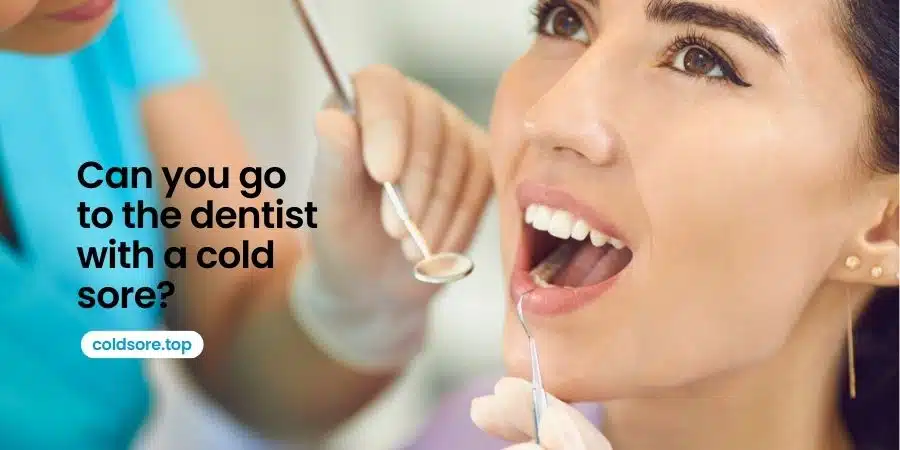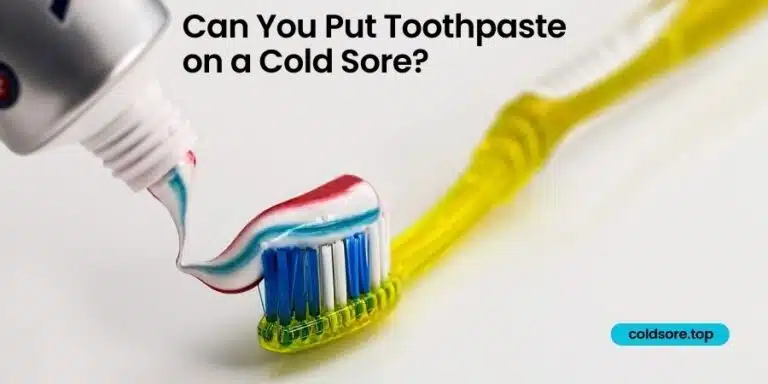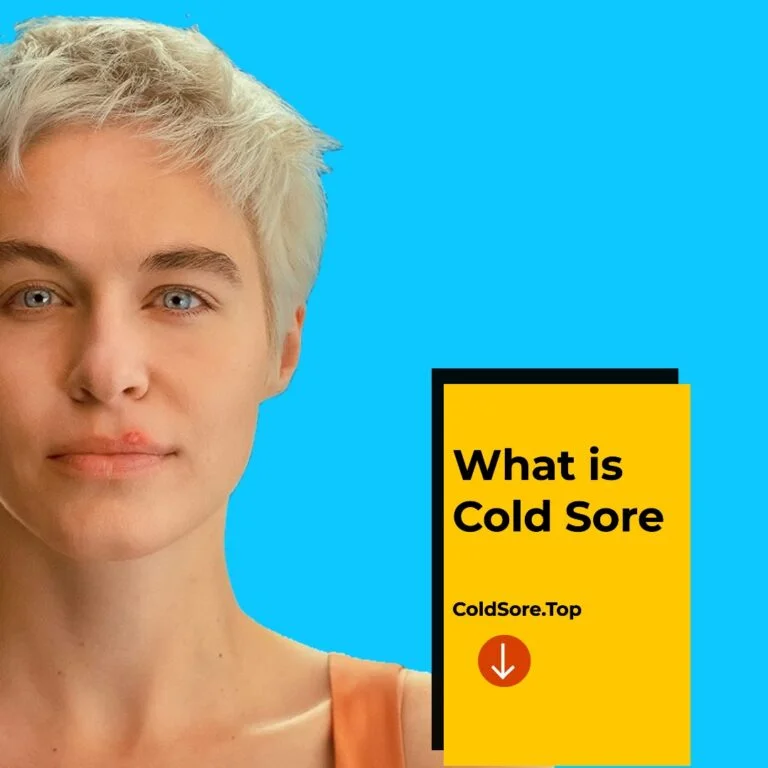Can you go to the dentist with a cold sore?
When faced with a dental appointment and the presence of a cold sore, it’s natural to have concerns about proceeding with the visit. However, with proper precautions and care, it is possible to attend a dental appointment even with a cold sore. This article explores the necessary precautions to take and the importance of caring for the cold sore before visiting the dentist.
Going to the dentist with a cold sore:
Yes, it is possible to go to the dentist but requires precautions to ensure the well-being of both the patient and dental professionals. We know that cold sores are caused by herpes simplex virus since HSV-1 is contagious and can be spread through direct contact. Therefore, it is crucial to take appropriate measures to prevent the transmission of the virus during the dental visit.
Can you go to the dentist with a cold sore? Know More about it
1). Importance of taking care of the cold sore before the dental visit:
Taking care of the cold sore before the dental visit is essential for several reasons. Firstly, it helps minimize discomfort during the dental procedure. Cold sores can cause pain and irritation, and undergoing dental treatment while experiencing these symptoms can be unpleasant. By properly managing the cold sore, the discomfort can be reduced, leading to a more comfortable dental visit.
Secondly, caring for the coldsore helps prevent complications and potential spread of the virus. Dental instruments can irritate the cold sore and potentially cause bleeding or further infection.
By ensuring the cold sore is adequately treated and in the healing stage, the risk of complications can be minimized. Additionally, taking precautions to avoid spreading the virus to others in the dental setting is crucial for the overall well-being of patients and dental professionals.
Taking care of the cold sore involves practicing good hygiene, using appropriate medications, and adhering to preventive measures. By following these steps, individuals can effectively manage their cold sores and ensure a safe dental visit.
In the subsequent sections, we will delve into specific precautions and considerations to keep in mind when planning a dental visit with a cold sore. These measures aim to protect both the individual with the cold sore and those they come into contact with during the dental appointment. By being proactive and taking the necessary precautions, individuals can navigate dental visits successfully while dealing with a cold sore.
2). Precautions and Considerations:
i) Talking to your dentist about the cold sore and necessary precautions:
One of the first steps to take when planning a dental visit with a cold sore is to communicate openly with your dentist. Inform them about the presence of the cold sore and discuss the necessary precautions that need to be taken during the appointment.
By informing your dentist, they can better understand your concerns and tailor the treatment accordingly. They may also provide additional guidance on managing the cold sore during the dental procedure.
ii) Calling ahead if you have an active cold sore:
If you currently have an active cold sore, it is advisable to call the dental office in advance. Some dentists may prefer to reschedule the appointment until the cold sore has healed and is no longer infectious. Calling ahead allows the dental office to make appropriate arrangements and ensures the best course of action for both the patient and the dental team.
iii) Using a cool compress for pain relief and reducing redness:
Cold sores can be painful and cause redness and swelling. To alleviate discomfort, applying a cool compress to the affected area can provide relief. The cool temperature helps numb the area, reduce inflammation, and soothe the pain. Remember to wrap the compress in a clean cloth or towel before applying it to the cold sore.
iv) Understanding the contagious nature of cold sores and the need to avoid spreading the virus:
It is important to be aware that cold sores are highly contagious. They can be transmitted through direct contact, especially when the blister is present or in the early stages of formation.
Even though dentists wear gloves during procedures, it is still possible to pass on the virus. To prevent spreading the virus, avoid touching the cold sore and refrain from activities like kissing or sharing utensils with others.
v) Optimal timing for dental checkup: after the cold sore has started healing (7-10 days after initial tingling):
To minimize the risk of discomfort and transmission, it is generally recommended to schedule the dental checkup after the cold sore has started healing. Typically, this occurs 7-10 days after the initial tingling sensation.
At this stage, the sores are crusted or scabbed, and they are less contagious. By waiting until this point, the risk of complications and discomfort during the dental procedure can be significantly reduced.
vi) Considering rescheduling if the crust or scab of the cold sore may cause discomfort during the dental visit:
If the crust or scab of the cold sore is in a location that may cause discomfort during the dental visit, it is worth considering rescheduling the appointment. Cracked or dry scabs can be painful when the mouth is held open for an extended period. By opting to reschedule, individuals can ensure a more comfortable experience and allow the cold sore to heal further.
vii) Keeping the dentist informed and discussing the situation at least 24 hours in advance:
Maintaining open communication with your dentist is vital. Apart from informing them about the presence of a cold sore, it is essential to discuss the situation at least 24 hours before the scheduled appointment. This advanced notice allows the dental team to prepare and make any necessary arrangements to accommodate your needs.
viii) Exploring options to speed up recovery, such as antiviral medications and over-the-counter remedies:
If you have a dental appointment on the horizon and want to expedite the healing process, there are options available. Antiviral medications prescribed by a healthcare professional can help reduce the severity and duration of a cold sore outbreak.
Over-the-counter remedies containing phenol and menthol can provide pain relief and promote healing. When considering these options, it is advisable to consult with a healthcare professional to determine the most suitable course of treatment.
By following these precautions and considerations, individuals can navigate their dental visits with a cold sore more effectively. Open communication, understanding the contagious nature of cold sores, optimal timing for appointments, and exploring recovery options are key factors in ensuring a safe and comfortable experience. Remember to prioritize your well-being and the well-being of those around you during your dental visit.
3). Dentists as Allies in Cold Sore Management:
i) Acknowledging the stress and frustration of cold sore sufferers:
Dentists understand the emotional toll that cold sores can have on individuals. Cold sores can be painful, unsightly, and often occur at inconvenient times. Dentists empathize with the stress and frustration that cold sore sufferers experience, and they strive to provide support and guidance throughout the dental treatment process.
ii) Building a partnership with the dentist to minimize outbreaks and virus transmission
When it comes to managing cold sores, dentists are valuable partners in minimizing outbreaks and preventing the transmission of the virus. By working together, patients and dentists can develop strategies to reduce the frequency and severity of cold sores. Dentists can provide advice on lifestyle changes, oral hygiene practices, and recommend treatments to help manage and prevent cold sores.
iii) Dentists’ willingness to reschedule appointments for patients with active cold sores to protect their staff and patients
To maintain a safe and healthy environment for both their staff and patients, dentists are often willing to reschedule appointments for individuals with active cold sores. This precautionary measure helps prevent the spread of the virus within the dental practice. By rescheduling the appointment until the cold sore has healed, dentists prioritize the well-being of everyone involved and minimize the risk of infection.
Dentists understand the contagious nature of cold sores and the importance of protecting both patients and dental professionals. By demonstrating flexibility and understanding, dentists ensure a safe and comfortable environment for all individuals seeking dental treatment.
It is important for patients to communicate openly with their dentist regarding the presence of a cold sore and to follow their recommendations for the best course of action. Together, patients and dentists can navigate cold sore management effectively and maintain optimal oral health.
Conclusion:
When faced with a cold sore and a scheduled dental appointment, it is crucial to make an informed decision. Consider the stage of the cold sore, its contagiousness, and your own comfort level. By assessing these factors, you can determine whether it is appropriate to proceed with the dental visit or reschedule for a later time when the cold sore has healed.
Regardless of your decision, taking precautions and maintaining open communication with your dentist is essential. Inform your dentist about the presence of a cold sore and discuss the necessary precautions to prevent the spread of the virus. Your dentist can provide valuable guidance and ensure the dental treatment proceeds safely and effectively.
Lastly, it is important to consider the contagious nature of cold sores and prioritize the well-being of dental professionals and staff. Cold sores are highly contagious, and even with protective measures, there is still a risk of transmission. By rescheduling appointments or seeking treatment during the healing stage of the cold sore, you contribute to the overall safety of the dental practice.
In summary, when dealing with a cold sore and a dental appointment, it is crucial to weigh the risks and benefits, make an informed decision, and prioritize the precautions and guidelines provided by your dentist. By doing so, you can ensure the well-being of yourself, the dental professionals, and other patients while receiving the necessary dental care.







